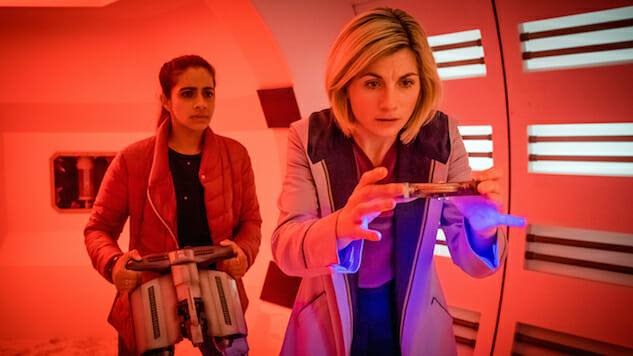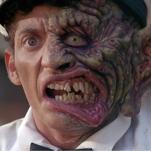Doctor Who Stumbles with the Scattershot “Tsuranga Conundrum”
(Episode 11.05)
Photo: Ben Blackall/BBC America
Matt Brennan and Josh Jackson review Doctor Who each week in a series of letters.
Josh,
Are you also experiencing comprehension deficiency?
When the Doctor (Jodie Whittaker) and her companions step on a sonic mine and find themselves aboard the medical rescue ship Tsuranga in the 67th century, hijinks ensue—probably too many, if I’m being honest. I have to imagine “The Tsuranga Conundrum” would have benefitted from ditching the subplot about Yoss (Jack Shalloo), the pregnant man who wants to name his baby boy Avocado Pear, or the one about celebrated pilot Eve Cicero (Suzanne Packer), her surly younger brother (Doc Brown), and a shifty-looking clone (David Shields), or even by making the episode’s Big Bad… well, bigger. (Um, can we talk about that metal-eating gray toad the size of an infant and with the teeth of a piranha? Or how to spell its name?)
This is the first time this season where I had a hard time separating the flaws in the writing from the fun bits, maybe because the plot overload itself is what sucked the suspense out of the main conundrum—how to get the ship to port safely—the characters face. I initially had high hopes for a Doctor Who version of the “strangers in space band together to face a nefarious force” trope, or even an homage to Alien, but “The Tsuranga Conundrum” is too scattershot to leave me feeling satisfied. To paraphrase the Doctor’s description of particle accelerators, I love it, conceptually, but I don’t love it, actually.
Am I being a killjoy? Or was this a disappointment for you, too?
—Matt

Matt,
This was definitely my least favorite episode of the season so far. I didn’t mind the Big Bad being kind of cute and tiny—basically a less cuddly version of Futurama’s Nibbler. But the setting (the generic, antiseptic hallways of a futuristic space station) and the subplots (“What if there was a species who looked identical to humans but where dudes get pregnant?”) were both underwhelming. The 67th century seemed a lot like the 21st, except with spaceships and a couple of unimaginative alien species. The most interesting visual was the opening scene of a an intergalactic junkyard.
I’m also realizing that the simple math of three companions means that character development is about three times as slow. Yaz (Mandip Gill) wasn’t given much to do besides punt a Pting down a hallway. Graham (Bradley Walsh) offered a little bit of grandfatherly wisdom. And Ryan (Tosin Cole) began to empathize a little with the plight of his dad, who became a father around his own age. The bright spot of this episode was that we got to see more of Whittaker growing into her role.
The Doctor immediately tried to take charge, not really considering the needs of her rescuers or fellow patients in the EMS spaceship. But when she’s confronted on her selfishness, there’s real self-awareness and growth. The Doctor doesn’t quite know who she is yet, but she’s learning who she’s not, and she can now check self-centered off her list.
But the more claustrophobic episodes of Doctor Who are often my least favorite—a cast of characters trapped in a small space with some technological or alien challenge to overcome. You can see the budget constraints on the screen, and that’s never a good thing.
So the flaws were pretty easy to pick out. What about the bright spots? Anything you particularly enjoyed this episode?
—Josh

Josh,
I, like you, thought the highlight of the episode was our deepening sense of the Doctor’s optimism, and what exactly that means. The prayer that caps off the hour struck me as overemphatic, but earlier on, when she’s trying to explain her credentials to Mabli (Lois Chimimba), the very green female officer left in charge of the Tsuranga, the Doctor hits a note I found rather apt for an episode airing two days before the midterm elections. After the officer says, “I’m struggling to see much hope here,” the Doctor replies, “It doesn’t just offer itself up. You have to use your imagination. Imagine the solution and work to make it a reality. Whole worlds pivot on acts of imagination.” As you suggest, it feels like Chibnall and Whittaker are starting to refine this Doctor, to fine-tune her, and learning that she is not blindly positive strikes me as key, now that we’re entering the second half of the season.
There were other throwaway ideas I got a laugh out of—threat level chalice, one up from beetroot; the Doctor being a committed Hamilton fan and Graham watching Call the Midwife—but on the whole I share your frustration with the companions’ character development. (To put everyone in a relatively limited space and then separate them for much of the running time anyway just feels like shoddy writing to me.) I guess I’m still not quite sure what to expect of the companions. Are they there so the Doctor has something against which to court and spark? Are we meant to see them as co-leads, or background players? The fact that I still have no idea five episodes in makes clear that this is where Chibnall’s Who has the most room for improvement.
To wit: We’ve talked about your favorite Doctors… Do you have any favorite companions, from past iterations of the show? And what can they teach us about the arcs of these new companions going forward?
—Matt

Matt,
Oooh. That’s a great question. With all the previous Doctors being male, the “New Who” companions have mostly been women—some of whom have had kind-of-inept, tag-along boyfriends. Rose (Billie Piper) is beloved, Martha Jones (Freeman Agyeman) had great chemistry with David Tennant, and Amy Pond (Karen Gillan) had a wild fearlessness that gave Matt Smith’s goofy enthusiasm a run for its money. But Donna had the advantage of being played by Catherine Tate, and that’s just not fair to the competition.
The Doctor’s companions help ground the Doctor in the best attributes of humanity, to give her someone to protect, someone to share the incredible nature of life with. Donna Noble felt the most like her own person and the unlikeliest to become a space/time explorer. She began as the kind of annoying office worker you’d go out of your way to avoid, terrified of the Doctor and of the universe beyond her little world. But her character growth felt real, and her parting with the Doctor was among the most heartbreaking in the series.
I want to see more of the current companions’ lives back on earth, especially Yaz’s. We got a glimpse of her family and her ambition, but she’s also been wasted in more than one episode. I want a Yaz-centric episode. Or even a Ryan/Graham-centric one. Something to flesh out these passengers, to give them the specificity that made Donna so compelling and original. I don’t doubt that we’ll get there; it just might be a slower journey with three.
—Josh







































